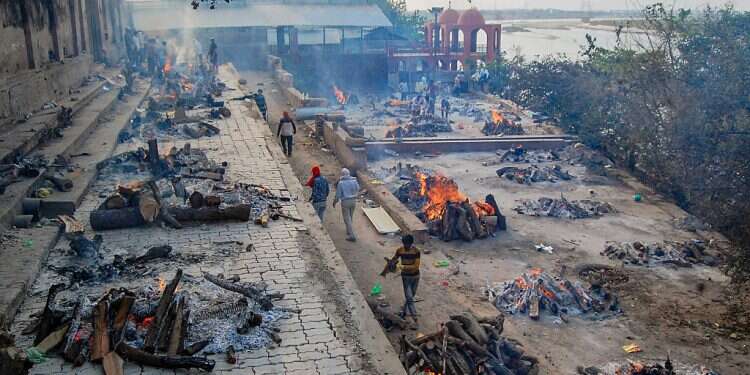Bhopal, INDIA
India registered 314,000 new coronavirus cases last Wednesday, taking its overall count since the beginning of the pandemic in January 2020 to 1,59,10,534. This was the highest-ever daily count recorded anywhere in the world for any country.
Some 40% of the world's new cases are being found in India. The Supreme Court on Thursday issued a notice to the government to elaborate on its preparedness when it comes to battling COVID. Noting that India was currently facing a national emergency-like situation, the court asked the government to submit its plan with details on the nationwide vaccination drive plan, the supply of oxygen and drug, the powers regarding lockdowns and more.
The speed of contagion can be judged from the fact that it took just 15 days to witness an increase in the number of new daily cases from 100,000 to 300,000 within the country. Now, the virus has started spreading in the rural areas of India which were left untouched by Corona.
Some 15 days earlier, 48% of the country's cases were coming from the state of Maharashtra. Now, Maharashtra is contributing only 20% of cases standing at three lakh new patients. 50% of the country's new patients are in 5 states Maharashtra, Chhattisgarh, Karnataka, Uttar Pradesh and the national capital Delhi.
Every third test in the national capital region Delhi is positive. After these emergent cases, most of the states are moving towards lockdown. There is a complete lockdown in Madhya Pradesh, Maharashtra, Rajasthan. The rest of the states are imposing partial lockdowns in select cities. However, Prime Minister Narendra Modi has appealed to states that the lockdown should be imposed as an option of last resort.
Scary pictures are emerging from all over the country. There are rows of dead bodies awaiting their turn at the crematoriums. In metro cities like Delhi, Lucknow, Bhopal, Mumbai, Surat, people have to wait hours to perform the last rites of their families. To eliminate this waiting, new platforms are being built at the crematoriums. "The fire of pyre is continuously flaring at the salvation site on the banks of the Hindon River in Ghaziabad, (50 km from Delhi) ", senior journalist Riyaz Hashmi said. Dr. NK Gupta, the chief medical officer Ghaziabad, added: "Deaths from COVID-19 are immediately updated on the official portal. People from Delhi and Noida are bringing bodies here, so funeral cases are increasing. "
Pramod Kumar Sharma from Ghaziabad, who lost his family member, said, "Hospitals are only giving information of death to the family. Doctors and hospital Staff are not divulging information pertaining to the inpatients even when they are called for. " Desh Deepak Singh, a lawyer in the Lucknow High Court (Uttar Pradesh), says, "I lost more than 12 friends within one week. Many people have died not from COVID-19 but because of the chaos of the administration. Patients get tested and then wait for the report for a long time. "
Until then, the patient's lungs are already severely damaged and are beyond recovery. Moreover, the absence of beds and improper facilities in the hospitals are further causing people to pass away without treatment. Public health expert Dr. Nikhil Srivastav says, governments did not use the lean period to boost facilities.
"We did not learn any lesson from the first wave. We had reports of some cities like Mumbai, Ahmedabad, Delhi running out of beds and that should have been a good enough reason to be prepared for the second wave," he said. The situation is much direr when it comes to ICU beds. Several cities have just a few dozen ICU beds left. Amidst all this, there is a shortage of oxygen-Remdesivir injections supply in most states of India. The demand for this injection has been flooded on social media and in the black market this injection is being sold at a price ranging between 250 to 300 US dollars. Central India State Madhya Pradesh has recorded 30 more deaths due to lack of oxygen.
The central government of the country has drawn a global tender of 50,000 metric tonnes of liquid medical oxygen to meet the oxygen shortage. The country has removed import duty on the anti-viral drug Remedicivir. The government waived customs duties on Remadecivir, its raw materials and other components used to make antiviral drugs. In the midst of all this, the progress of covid vaccination in the country has also slowed down. 130 million doses have been taken so far. Of these, 111.6 million people have been given one dose and 18.5 million people have been given both doses. According to Dr. Balaram Bhargava, director of the Indian Council of Medical Research (ICMR), the vaccination program has been successful so far. After the second dose, only 0.03% (5709) people have been infected. After the first dose, 0.02% (21,353) of people have been infected. Dr. Bhargava says that it is a small number and not worrisome.




